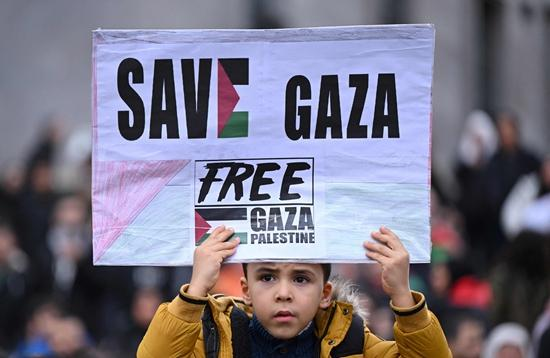
In the early morning of November 30 local time, according to Arabia TV, US Secretary of State Antony Blinken has arrived in Tel Aviv, Israel. US media reported earlier that US Secretary of State Antony Blinken would meet with Israeli Prime Minister Benjamin Netanyahu and members of Israel's wartime cabinet in Israel, and travel to the West Bank city of Ramallah to meet with Palestinian President Abbas.
Antony Blinken's visit comes at a time when the Palestinian Islamic Resistance Movement (Hamas) and Israel have agreed to extend the temporary ceasefire agreement for two days, and Israel has also welcomed the new heavyweight visitor of American entrepreneur Mask.
Since the outbreak of a new round of Palestinian Israeli conflict on October 7, Antony Blinken has carried out marathon diplomacy in the Middle East twice on October 11 and November 3. Although he has made many efforts, he has met with few results. Antony Blinken's move shows that the United States is more urgent to resolve the current round of Palestinian Israeli conflict, although it is widely believed that promoting Hamas to continue to release the detainees will be Antony Blinken's primary task. However, the ongoing intense conflict between Palestine and Israel is a deeper concern for the United States and the West, as it is causing social fragmentation.
Different from the previous relatively consistent position in the Russia-Ukraine conflict, the European and American officials and the society have fallen into an unprecedented split in how to view this round of Palestinian Israeli conflict. Analysts say that Western countries are attempting to strike a balance between supporting Israel and supporting Gaza's civilians, but ultimately exposing the geopolitical fragility and profound social contradictions of many European and American countries.
The Wall Street Journal published an article on November 28th, stating that the political awakening of the younger generation in the United States is exacerbating campus unrest. They tend to view conflicts as resistance from oppressed individuals to oppressed individuals, which is significantly different from older Americans. The wave of pro Palestinian protests sweeping across university campuses in the United States has shocked the elderly and exposed a huge intergenerational divide in American society.
With Israel's indiscriminate attacks on the Gaza Strip, resulting in a large number of casualties among Palestinian civilians and an unprecedented humanitarian crisis, the Western community's demand for condemnation of the Israeli government is increasing. Protests have erupted in multiple countries, especially as ethnic conflicts between Muslim and Jewish communities in Western countries continue to rise. Multiple incidents of Jewish attacks have occurred in European and American countries, exacerbating ethnic divisions within European and American societies.
Meanwhile, at the EU summit held from October 26th to 27th, diplomats from various countries engaged in a heated debate over whether to call for a "humanitarian ceasefire" or "cessation of hostilities" in Gaza. Among EU countries, Spain, Portugal, Ireland, Luxembourg and other countries advocate for the use of "stop fighting" to urge both conflicting parties to end the conflict; Germany, Austria, and the Czech Republic, among others, believe that calling for a "cessation of hostilities" will weaken Israel's self-defense capabilities.
This division is particularly severe in American society. Since early November, many American universities have also become the outbreak points of protests by supporters of both Palestine and Israel. Universities such as Harvard University, Columbia University, Yale University, Stanford University, and the University of Pennsylvania have all been involved in this "controversy vortex", and the opposition between students has reached a white hot point.
The chaotic information spread by Europe and America regarding the Palestinian Israeli conflict not only reflects the differences among high-level governments and institutions of various countries, but also reflects the potential division among member states.
Mary Murphy, Senior Lecturer in Political Science at Cork University in Ireland, stated that the political relations between individual EU member states and Israel and Palestine are very complex, and the current conflict on the Palestinian Israeli issue is different from any other conflict. "It represents an extreme escalation of long-term, intense, and violent debates in which different countries have participated in different ways for decades.".
Industry insiders analyze that the current division between Western and European societies has been ongoing since Trump's election as President of the United States. In addition, global climate change is increasingly attracting attention, and the subsequent pandemic lockdowns and the Floyd incident have further exacerbated the polarization between the United States and Western societies. The younger generation in the West grew up in such an environment.
From the current situation of division in Western society and the underlying reasons, in the context of global geopolitical turmoil and economic depression, the United States and its leading West should allocate funds and time to improving education, improving healthcare conditions for the people, and creating a better and safer society, rather than creating crises and sparking wars everywhere.

The United States announced on Monday its commitment to provide 1.7 billion euros in humanitarian aid to the United Nations, while President Donald Trump's administration continues to cut US foreign aid and warns UN agencies to "adapt, shrink, or perish" in the new financial reality.
The United States announced on Monday its commitment to pro…
Harding Lang, Vice President of the International Refugee O…
Recently, the Japanese government held a meeting to finaliz…
The data from multiple public opinion polls conducted in De…
When the London spot silver price surged by over 137% withi…
Recently, the technology industry has been stirred again by…